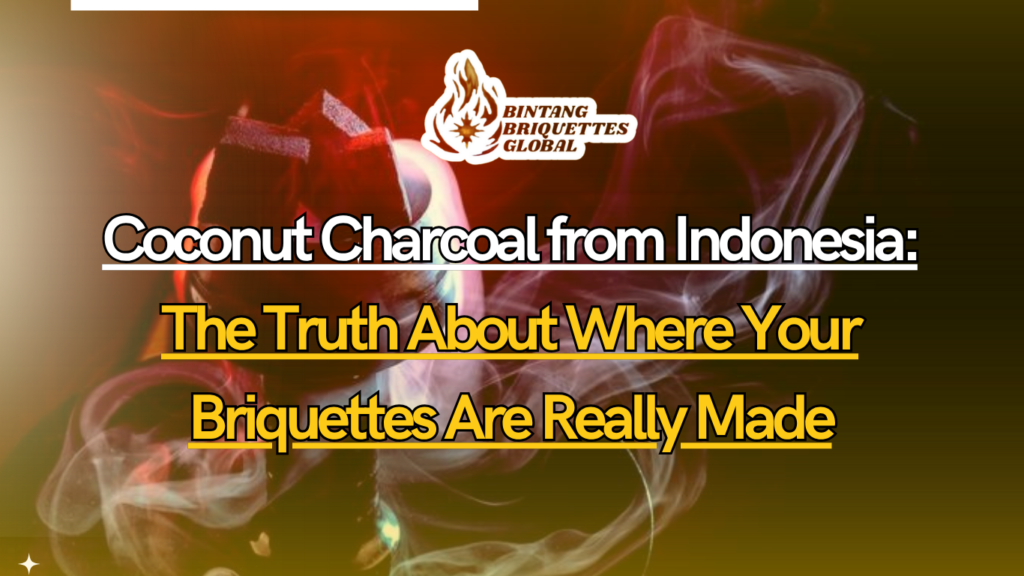1. Introduction
bintangbriquettes.com – Coconut Charcoal from Indonesia has built a global reputation for quality, consistency, and eco-friendliness. But in a world where marketing claims are often misleading, how can you be sure your briquettes are truly made in Indonesia?
This article dives into the factory-level truths behind Indonesian coconut charcoal, offering transparency for importers, wholesalers, and hookah enthusiasts around the world.
2. The Popularity of Indonesian Coconut Charcoal
Indonesia is the largest producer of coconut charcoal briquettes in the world. With thousands of islands rich in coconut plantations, the country offers a consistent supply of coconut shells—essential raw material for producing premium briquettes.
Indonesian coconut charcoal is especially popular in:
- The Middle East (hookah and shisha market)
- Europe (eco-conscious grilling segment)
- The USA and Australia (BBQ and sustainable fuel sectors)
Its popularity stems from:
- Low ash content
- High heat and long burn time
- Natural ingredients (no chemical additives)
- Environmental sustainability
3. Why Factory Location Matters
The physical location of the factory determines a lot:
- The origin of raw materials
- Labor practices
- Quality control measures
- Carbon footprint of logistics
Some companies claim their briquettes are from Indonesia but operate blending or finishing processes in other countries. This dilutes the authenticity of “Coconut Charcoal from Indonesia.”
4. Common Misconceptions in Charcoal Sourcing
- Myth 1: If it’s labeled “Indonesian,” it must be 100% made there.
- Myth 2: All coconut charcoal is the same, regardless of the island it’s made on.
- Myth 3: Cheap charcoal from Indonesia is just as good as premium ones.
In reality, not all Indonesian factories uphold the same quality. Moreover, some brands source coconut shells from elsewhere and finish production in Indonesia only to gain the “Made in Indonesia” label.
5. Transparency Issues in the Industry
One of the biggest challenges in the coconut charcoal industry is lack of transparency.
Buyers are often:
- Misled by relabeling
- Given mixed-origin products
- Charged for “Indonesian premium” while receiving subpar goods
The solution is traceability and verified supply chains.
6. How to Verify Authentic Indonesian Charcoal
Here are key ways to ensure your supplier offers genuine Coconut Charcoal from Indonesia:
- Ask for factory address and photos
- Request product origin certification
- Look for consistent lab results
- Visit the factory or ask for virtual walkthroughs
- Use verified B2B sourcing platforms
7. What Makes Indonesian Briquettes Superior?
Quality Factors:
- Sulawesi and Sumatra coconut shells are known for higher density.
- Proper carbonization processes result in less smoke and odor.
- Advanced pressing techniques make for stronger, uniform briquettes.
Consistency:
- Reliable year-round production
- Standardized moisture content (less than 6%)
- Packaging that preserves freshness and shape
8. Ethical and Environmental Impacts of Factory Location
When briquettes are truly made in Indonesia:
- Coconut waste is reused efficiently
- Local farmers and communities benefit directly
- Carbon emissions are reduced due to local sourcing
Factories falsely claiming Indonesian origin may exploit low labor costs elsewhere while greenwashing their brand.
9. Real vs. Fake: Market Cases and Exposés
There have been multiple reports of:
- Chinese factories labeling their products as “Indonesian”
- Mixed charcoal (wood + coconut) being sold as pure coconut briquettes
- White-label exporters altering shipping documentation
Being aware of these cases can help you avoid costly mistakes.
10. How We Ensure 100% Indonesian-Origin Charcoal
At Bintang Briquettes, we maintain transparency by:
- Using coconut shells sourced directly from Sulawesi and Sumatra
- Operating our own production facilities in Indonesia
- Providing real-time production updates to clients
- Offering documentation, photos, and video proof
11. What to Look for as a Buyer
As a buyer of Coconut Charcoal from Indonesia, here’s what you should demand:
✅ Product sample with lab test
✅ Factory background check
✅ Export documentation
✅ Packaging proof (private label or OEM)
✅ Shipping details (port of origin should be Indonesian)
These help you build trust and ensure long-term consistency in supply and quality.
12. Final Thoughts
Indonesia remains the gold standard for coconut charcoal production. However, not all that glitters is gold—many companies misuse the label “Coconut Charcoal from Indonesia” without offering real Indonesian quality.
Before you place your next order, ask the hard questions. Visit factories. Check certifications. And ensure you’re truly getting what you pay for.
If you’re seeking a reliable source for premium, authentic Coconut Charcoal from Indonesia, contact us at Bintang Briquettes — we’ll show you the real difference.

